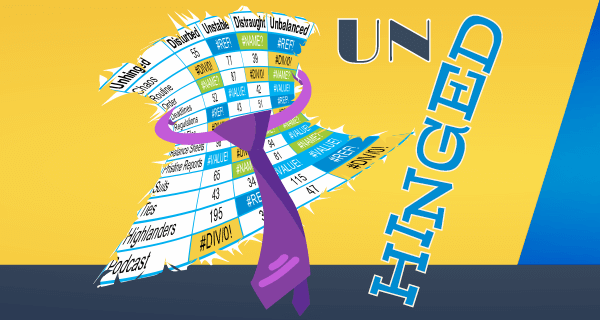Episode 13
Don’t miss out on other podcast episodes from Dean Dorton! Listen and subscribe:
Transcription
Good morning good people. I’m Justin Hubbard, here with another episode of Unhinged. Today’s topic is one that I’ve spent a lot of time thinking about, reading about, dissecting with other people, a whole lot of time observing thus far, and all that being said, I still don’t know what to do with it. This is the topic of how to manage multiple generations in the workplace. Scholars are dissecting this. Books have been written. There’s conferences devoted to this title, and we still don’t have it figured out. Okay. So generations I’m saying I’ve got Baby Boomers, Gen Xers, Millennials, Generation Z.
So I’ll start with Baby Boomers. Typically, these are considered folks born between 1946 and 1964. Some distinguishing characteristics are generally optimistic, competitive, team-oriented, and workaholics. Shaped by … So I think this is a very, very interesting what each generation is shaped by some very significant events that have transpired during their year, between the years of birth. So for Baby Boomers, the Vietnam War, then the Civil Rights Movement, and then Watergate.
All right, Gen X, Generation X, 1965 to 1980. They represent about 33% of the current workplace versus 25% for Baby Boomers. These Gen Xers are typically thought of as being flexible and formal, skeptical, independent, and they were shaped by the age epidemic, the fall of the Berlin Wall, and the onset of the internet, the internet boom.
Now Millennials, for dramatic effect, 1981 to 2000. So I was born in ’81. I don’t know if that makes me a light Millennial or a heavy Gen Xer, but whatever, are at 35% of the workplace. These folks are seen, contrary to popular opinion, as being competitive, achievement-oriented, and civic-minded. And they were shaped by the significant events of Columbine, school shootings, 9/11, and the internet lifestyle.
And lastly, we’ve got Generation Z coming from behind, anyone born post 2001. Only 5% of the current generation, but these folks are considered global, entrepreneurial, more network, more connected, less focused, very, very progressive, and they’ve been shaped by the life after 9/11, the economic recession of 2008, and lifelong access to technology. These folks were babysat by your iPhone, by your iPad, your tablet, by your smart TV.
But what, I think, is a little bit more interesting is if you take it a step further, and if we talk about what sociologists would say motivate these various generations and in how they actually see the world, what their worldview is. So Baby Boomers, motivated by company loyalty, teamwork, and duty, and they see the world from the lens of achievement comes after paying one’s dues, sacrifice for success. Gen X, all right, motivated by diversity work life balance through personal-professional interest rather than the company’s interests, and that the world view is very, very high on diversity, quick to move on if the employers fails to meet their needs, and resistance to change at work if it impacts the personal lives.
Now Millennials they’re motivated by more responsibility, the quality of their manager, interesting, the quality of their manager, and unique work experiences. They seek challenge, growth, and development. They seek fun, a fun work life and work balance. Lastly, to leave an organization if they don’t like change. So you’ve got … It’s interesting. You’ve got Millennials who are looking for change and potentially Generation Xers who are quite resistant to change or willing to leave if change impacts their personal lives. And then lastly, Generation Z, very motivated by diversity, the ability to personalize their career, personalize their experience in every way, very individualistic, and also very creative. And they see the world through a lens of they self identify as digital device addicts. That’s the way they communicate. That’s the way they want to be communicated with. They value independence and individuality, and they … it’s interesting. They are documented as preferring to work with Millennial managers, innovative co-workers, and new technologies. So things that are are more progressive, advancing forward, not staying the same.
So with that, and there’s nothing special about what I just went through. That was an obligatory list, just so everyone has some frame of reference for what I’m talking about. We’ve got our definitions. We’ve got our labels. We’ve got our categories. So I guess we’re done, right? So now we know what to expect from the team, what they would deliver, we don’t even have to engage them anymore, okay? We know Baby Boomers are going to do this. Millennials are going to do this. So are we done? All right? Young people are scared and lazy. Old people are stubborn and stuck in their ways. The folks in the middle are annoying, whinny cynics, okay? Can we now go to our favorite corner of our office, find people who are just like us, talk about everyone in the other corners of the office, because they aren’t just like me?
We’ve got scientific research and published papers to justify our behavior, why we are they way we are. And if you don’t like me, I’m going to make life hard on you, if I’m your supervisor, or if I’m the one being supervised to thought, I don’t like it, then maybe I’ll just pack my fidget spinners, empty my drawers, and I’m going to leave. But I think we would all agree it’s not that easy. It’s fun. We’ve made a sport almost out of labeling the different generations by these broad strokes. I’m finding more and more, as I talk to businesses, as I work with my own team, these broad strokes aren’t working. You can’t build plans based upon articles that you Googled, right? It takes interaction.
We don’t know what to do with people who are different than us. It’s easier to push them off the proverbial bridge, get them out of our lives, to build a fence around ourselves, to keep them out unless we absolutely have to, rather than to get to know them. Now obviously this isn’t going to work. Businesses can’t develop their transition strategies from the more experienced to the lesser experienced team members. They’re relying on these stereotypes as your guide. Take that one step further. We’re not going to be able to engage the younger generations. We can’t train the younger generations. We can’t even educate older generations, right, if there’s new ways of doing things, if we’re only willing to stick to what we know or what we’re comfortable with or experience, the way we were trained in how to do things.
So an article was published in August of 2019 in the Harvard Business Review titled “Generational Differences at Work are Small. Thinking They’re Big Affects Our Behavior.” Only Harvard Business Review would have an article title that is literally two sentences. But nonetheless, in this article or in this research summary, the researchers found that the difference between generations in the workplace are actually significantly overstated. People typically want the same things. So I’m quoting here, “An analysis of 20 different studies with nearly 20,000 people revealed small and inconsistent differences in job attitudes when comparing generational groups. It found that although the individual people may experience change in their needs, interests, preferences, and strengths over the course of their careers, sweeping group differences, depending on age or generation alone, doesn’t seem to be supported.”
That’s the game changer. Yes, people are different, but you can’t paint in these huge broad strokes. So these differences, at least in job attitudes between generations in the workplace may not be as significant as we think, but what matters is not that the actual differences exist, but that people think these differences exist. That same article goes on to talk about that there are actual two angles of research in this workplace generations area. The first is age stereotypes, which looks at the content and the beliefs of people from another age group. But the second is called meta stereotypes. Meta stereotypes look at what we think others believe about us based on our age group. So a young person may think that others see them selfish or flighty just because they’re young, while an older person may worry that they’re seen as stubborn and unwilling to change because they’re the older generation.
So in practice, Harvard Business Review researchers found that workers, regardless of generation, believe that they are viewed more negatively by their coworkers than they actually where. Workers are actually being distracted by the possibility the age or generational stereotypes define who they are at work more so than their actual results and productivity while at work. In some cases, this has shown to be a motivating force, but in a lot of cases, this is driving conflict and damaging coworker relationships because coworkers are closing themselves off from their colleagues. They feel like they’re judged. They feel like they can’t do enough. They feel like the cards are stacked against them because of the decade that they were born. That’s scary. And I think we need to pause and think about what are our biases? What are the big, broad assumptions that we’re making when we work with people who are of a different generation than us?
So we have volumes of data around age stereotypes, the different traits of Boomers, Gen Xers, Millennials, Generation Z, and et cetera, but we also are finding this evidence that this data is leading to workers being distracted. So what do we do with that? I don’t have the answers, but let me offer this. As a parent, we have several words that we don’t let our four children use, specifically in a negative position. Two of these words are never and always, these words are, I believe wholeheartedly, that these words are dangerous generalizations. If something is always one way, then it never can be something else. If someone thinks I’m always grumpy in the morning, then their mind has been made up even if I walk in with a smile on my face and a in a pack of donuts. Generalizations, like never and always, they kill children’s ability to process relationships, the relationship with the world, and their ability to build relationships with siblings, with parents, with peers.
And I think we, in business, are quick to age stereotypes as broad, dangerous generalizations with one another. Not letting my kids say never and always in a negative position, that’s an extreme example, but I feel like we do the same thing when we’re talking about Millennials or Baby Boomers or Generation X or whomever it is. We’re painting with these huge generalizations and reaching conclusions rather than doing the hard work of getting to know people. And I think we’ve been tricked into thinking the only people that matter are those that see the world like we do, who perform like we do, who laugh at the same jokes, watch the same television channels as us, cheer for the same team and on and on.
Now it’s funny. We’re in Kentucky. The two big sports team, University of Kentucky and University of Louisville, and you can watch people have a conversation and they will agree on five things. And then sports comes up and one person is a Louisville Cardinal fan and one person’s a UK fan. And it’s it, you can just see there’s like a snarl and all of a sudden what was warm cools off a little bit. And it’s just, it always amazes me. People used to say that we are a society of silos. I think we’ve gone a step further and we’ve become a society of pockets within these silos. I don’t think the issue we’re experiencing in the workplace is necessarily generational differences.
I mean, I think there’s something to be known there to be aware of, but the issue is that we’ve lost the ability to engage with one another, to lead other people, despite not having much in common, to appreciate that other people are just trying to figure life out. I mean, people have a bad month, a bad quarter, or a bad year, even it doesn’t make them a bad person. Or if someone is struggling to take on a leadership position that maybe the other leader felt they should be ready to handle. Maybe that person really has never been trained on how to lead or maybe that person is in over their head or maybe that person has something going on at home. Maybe the new person that you just brought in to help your team, who didn’t get off on the right foot, maybe they interviewed well. Maybe they are smart. Maybe there’s a lot of value there, but maybe that it just takes them a while to get going, or maybe they have something going on at home and you just need to ask them about it and get to know them.
So that’s a lot of ranting. I definitely think generational stereotypes have some validity as a data point, but it’s not a data set. We need to interact. We need to get to know people. We need to meet at the water cooler. We need to meet … Maybe we need to have weekly Zoom calls where we talk about anything, but work. We just talk about life. It is interesting to know, just from that generational data, to look at maybe the people who fall in that Millennial bucket and think, “Oh, so they grew up in the shadow of 9/11,” and how do you process that? And then maybe they can find a, if you grew up in the shadow of 9/11, and you realize that two generations before you, the Baby Boomers, they had the same situation with Vietnam, maybe there’s some commonality there. Maybe you’re not as far apart in terms of your worldview as your age would indicate.
But however, we can’t make conclusions and draw correlations across the board just because of the data that’s out there. Interaction, getting to know each other, figuring life out together, giving people the opportunity to learn from your screw ups and successes, and then willing to learn from their screw ups and their successes, and that that’ll tear down these generational walls.
Your Host








